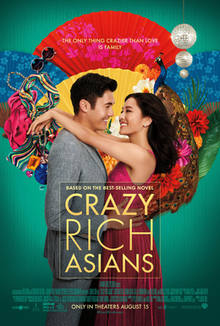
By Avia Hailey
This film is categorized as a romantic comedy, but as it delves deeper into societal and cultural issues it becomes so much more. The film begins with a flash back to an “old-timey” 1995 London. Eleanor Young arrives with her children, all soaked from the rain, to the hotel where she reserved a suite. They are turned down their suite by an all white, condescending male hotel staff. From the body language and speech that the staff give, the watcher is eluded to the fact that Mrs. Young and her family’s presentation, is the reason they are denied service (that being both their race, gender, and appearances). After watching that part of the movie I immediately thought about Judith Lorber’s definition of male hegemony in Gender Inequality. She defined it as “men’s dominance in values, knowledge, culture, and politics”. By denying the Young’s service, the male staff at the hotel were asserting their idea of the “ideal” customer for the hotel and then projecting it on the Young’s to make them feel lesser than. The irony of that moment is that the Youngs own the hotel (unbeknown to the hotel staff) so they are the ones that “truly” belong there.
As the film continues you are introduced to the main character Rachel Chu. She is an economic professor at New York University (NYU). Through a game theory demonstration she is able to show both her intelligence as well as cunning manner. Later on in the film the watcher finds out, she is a self-made women from a single mother household, that worked hard to get where she currently is. The character of Rachel is a prime example of feminist theories in action. For example, Liberal Feminism’s focus on deconstructing the “glass ceiling”. The “glass ceiling” can be described as “an intangible barrier that prevents the advancement in a profession, especially affecting women and members of minoritized groups.” Rachel becoming an economics professor at a prestigious institution such as New York University is a direct result of feminist theory. Her story is a testimony to change and the deconstruction of corrupt structures and narratives.
Let’s take a look at another strong female character in the movie, Mrs. Young. She also went to a prestigious university, but instead of finishing her degree and becoming lawyer, she dropped out to put her family first. This was expected of her because of her culture and the family she married into. It was required of her to be a “dutiful” wife, and even at her best she was never seen as enough by the matriarch of the family. This idea of Asian women being dutiful and subservient to their husbands in not new. In “Interracial Romance” Kumiko Nemoto explains that Asian women are seen as “good wives,” because of the dominant narratives saying they are “submissive, subservient, passive, and/or hypersexual”. These characteristic in a women supposedly help reinforce masculinity, which is why Asian women are popular to marry. It is interesting how even after all these year males dominance over women and the pressure to be a “good” wife is deeply ingrained not just into Asian cultures, but in cultures worldwide. In the essay “Disability, Embodiment and the Meaning of the Home” Rob Imrie talks about the home being a potential place of repression and confinement for women. If we hold onto the hundred year old idea of women solely being fit to serve their husbands and their “homes”, then that is exactly what it will become. We need more Rachel Chu stories in the spotlight to help propel change. Stories that deconstruct structures within society that keep women below men.
Note: This essay was written by a student in Dr. Heidi R. Lewis’ First-Year Experience (FYE) course FG110 Introduction to Feminist and Gender Studies. FG110 teaches students how to examine, power, inequality, and privilege along the lines of gender, sexuality, race, socioeconomic status, age, physicality, and other social, cultural, and political markers using multi-, inter-, and transdisciplinary approaches. The students visited a local theatre to screen Crazy Rich Asians, and this essay was written in response.

